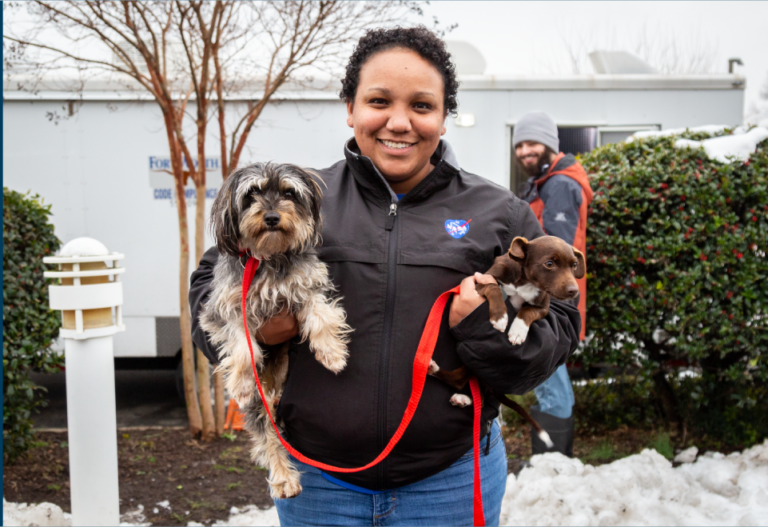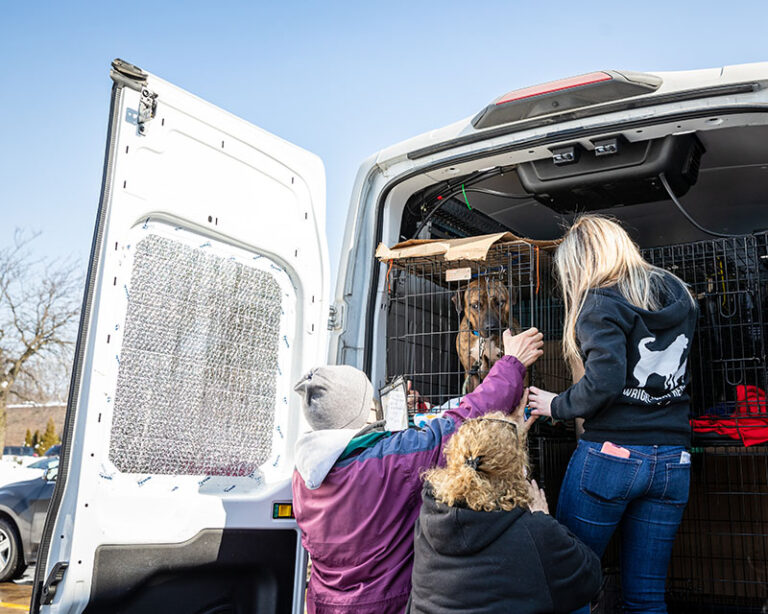Veterinary care is expensive, and can be hard to access—leading to pets going without needed treatments, and being given up to shelters by their families, who believe this is the only way for a loved pet to get the care they need.
The Open Door Veterinary Collective is working to change that. This nonprofit, founded in 2021, is developing a business model for nonprofit, for-profit, and government veterinary clinics that prioritizes access to care, and increased revenue. Open Door sees major upsides for shelters and the communities they support.
What follows is a Q&A produced by Open Door Veterinary Collective founder Aimee St. Arnaud, who brings 20 years of experience in animal welfare to this project, including as director of programs for Humane Alliance’s national spay/neuter mentorship and training programs that helped open and train over 170 clinics during her tenure, and Dr. Sara Pizano, the founder of Team Shelter USA, author of The Best Practice Playbook for Animal Shelters, and a national trainer for Open Door where she teaches clinics how to implement this new model.
Be sure to also check out the Human Animal Support Services resource on increasing access to veterinary care.
Question: Let’s start with the basics! What is the model taught by Open Door Veterinary Collective?
Answer: We are a national nonprofit that believes all pets should have access to quality veterinary care AND that veterinary practices should get paid for their services.
Our team of veterinarians and business managers works with private practices and with nonprofit organizations to implement sustainable business model tools that remove barriers in providing and obtaining accessible veterinary care. We are building a national network of clinics; and we focus on research and innovation to support clinics, staff, pet families, and pets.
Our model, and training, includes: implementing payment support options and removing the stigma of talking about financials; building strong client communications and relationships; inventory cost savings; pricing strategies; budgeting and key performance indicators to ensure a sustainable practice; efficient scheduling practices; building partnerships between private practices, nonprofits, and human service agencies; adding social workers into the practice; and staff well-being.
Question: How is that different from a nonprofit clinic providing medical care?
Answer: The Open Door model focuses on helping nonprofits reduce the amount of money needed to subsidize or give away veterinary services for free, while opening up other payment support options and partnerships to help even more people and pets get veterinary care.
We find it’s a huge burden on an organization to continually raise large amounts of subsidy funds. Pet owners seeking nonprofit veterinary care typically have limited access to cash and usually can’t pay for veterinary services using traditional forms of credit. But most are still capable of paying over time or able to pay back some.
We train staff on how to remove the stigma of conversations around finances and what resources are available, and we help them reduce costs and ensure they are operating as efficiently as possible.
This can be a game-changer in how we expand access to care services. Nonprofits often feel they can’t or shouldn’t make a profit but these funds can go back into programs to help more people and pets.
Question: So it sounds like this model works well for nonprofit hospitals. Can you talk about whether it works for for-profit veterinary clinics, or those that are run by the government?
Answer: Our goal is a national network of practices that increase access to care.
The Open Door model works equally well for nonprofit, for-profit, or municipal community clinics. However, since there are only a couple thousand nonprofit hospitals and more than 30,000 for-profit hospitals, the ultimate goal is to have this financially sustainable model woven throughout the entire veterinary industry.
Question: How are you so sure this model works?
Answer: The Community Pet Care Clinic in Toledo, Ohio, and Open Door Veterinary Care in Asheville, North Carolina, are pilot sites to test the model and it’s working! We currently are working with 20 nonprofits opening or expanding their clinics in this model, all with positive results.
The Open Door Veterinary Collective mentors organizations in implementing this business model. As part of the Maddie’s Million Pet Challenge, we can also offer pro bono mentorships for organizations that want to start a clinic or integrate our model into their existing clinic.
Learn more about participating on the Open Door Veterinary Collective website.
Question: How is this model related to the Human Animal Support Services model of community-focused animal services?
Answer: We know that lack of access to veterinary care is one of the top reasons for surrender to animal shelters. When we open the door to help people gain access, we can reduce the number of animals at risk of being surrendered and help pets get care who might otherwise go without.
This fits with the HASS model, in which animal shelters take on a new role by supporting families and pets, and by changing how we think about who should have a pet and what it’s like to face a crisis with your pet.
It is easy to say, if you can’t afford a pet you shouldn’t have one. However, there are many animals who are deeply loved by their families. A family’s inability to afford veterinary treatment doesn’t indicate a lack of love or attentive care. Nor does it imply that they are a bad, irresponsible, or neglectful pet owner.
Many of us are just one health issue, accident, job loss, or pandemic away from not being able to afford a large veterinary bill. Our model focuses on removing those barriers, in line with the HASS mission of keeping people and pets together.
Question: Are you asking veterinary clinics to see more patients, or make less money?
Answer: No. The Open Door model helps existing clinics provide the preventive and medical care veterinarians are recommending and pets need. If a pet owner is unable to pay for treatment at a veterinarian’s office up-front and they have no other payment options, they often fail to seek care or leave the clinic without treatment for their pet. With this model, the pet can receive the care they need. It’s about expanding access to care.
The Open Door model can actually increase revenue because it offers more payment support options to existing clients and can attract new clients, which is typically the goal for private clinics. We’ve found that the majority of people can afford to pay but they just can’t afford to pay unexpected or large expenses all at once up-front.
A good example is dentals. Many people often go without dental care for their pets because of the expense, but one clinic saw their dental revenue increase by 30% when they allowed people to pay over time. This means more pets get crucial dental care maintenance before they develop serious periodontal disease.
So it can bring in new clients but if you are already overwhelmed and don’t want to take in new clients you can focus on just helping existing clients get the care their pet needs. We focus on building the relationship between pet owners and the veterinary clinic. Not only does the model provide the ability to increase revenue, it also helps with staff well-being who don’t have to turn people away and see pets go without care. As a result, the clinic can see more positive reviews and feedback.
Question: What are your key takeaways?
Answer: The cost of veterinary care has escalated much higher and faster than inflation, and while it impacts lower-income pet owners the most, more middle- and high-income families are becoming financially fragile and struggling to provide care.
It’s also getting more expensive for clinics to provide care and cover costs. It ends up being a vicious circle where pet owners can’t afford care when payment is expected upfront. They are faced with going without care, surrendering their pet to a shelter, or economic euthanasia.
Veterinarians get blamed for not caring and being money hungry, face negative reviews, and burn out. That results in relationships being frayed. Meanwhile, pets are stuck in the middle.
We need to move from that vicious circle to a full circle that includes partnerships between nonprofits, private practices, human services, and pet owners.
Question: Do we have any good examples of how this works in practice?
Answer: We have many great examples!
Community Pet Care Clinic partners with local social service agencies as a referral for pets in need. Neighborhood Properties connected us with Bev, who was recently released from the hospital after being ill with COVID-19 and has been staying at a local hotel with her pup Cadence for a month due to lack of housing.
We were able to connect them with the nonprofit Compassionate Village who helped them raise funds to stay in the hotel, and made sure Bev and Cadence had food through their outreach program.
Cadence developed an oral abscess and needed an extensive dental, which we did at Community Pet Care Clinic. We covered the cost between our Stay Together Fund where we give $1 from every healthy pet exam, funds raised through social media, and Compassionate Village fundraising. This is a great example of how human services, nonprofits, and private practices can all work together to help pets and the people behind the pets.
Another example that comes to mind is Kona. Her owner adopted her from a neighbor and we worked with her to budget for Kona’s preventive care. She told us she had $10 left over in her checking account after she paid for the preventive care.
When the heartworm test came back positive and the estimate for $500 was provided, Kona’s owner broke down.
We were able to link her to funding with One Love Pets, a nonprofit that sponsored her treatment. Kona’s owner cried and said, “I had no idea how I was going to pay for Kona’s heartworm treatment, and our entire family was devastated. I could never thank Open Door enough for putting us in touch with One Love Pets! Kona is now fully recovered and hanging out with her favorite fish, Baxton!”
Entrepreneurs and innovators can save animals’ lives! Reach out and tell us about the tech innovators, entrepreneurs, and pet lovers you know who are setting their minds and resources to solve the biggest, toughest, most important problems facing animal welfare.






